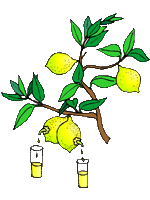

The Golden Lemon by Colette Christian, Conscious Choice, May 1999 "I'll be with you in the squeezing of a lemon." -- Oliver Goldsmith, She Stoops to Conquer.
What would we do without lemons? Bright and golden, they have no season in our markets. The lemon is almost always available to brighten our cooking.
The lemon has been cultivated for so long that its wild varieties are unknown. We do know that it was brought to the Mediterranean from the East Indies and Malaysia; it reached Europe by the twelfth century. Columbus introduced the lemon to the New World in 1493, and lemon groves were first planted in Florida by the early 1500's.
Botanically, the lemon tree is known as citrus limon. As a tree, it is stately and beautiful, blooming and bearing fruit several times a year. In the U.S., lemons are grown commercially in California and Arizona. The varieties that we find in Chicago markets are the Eureka and the Lisbon. The delicate Meyer lemons appear on the West Coast in the spring and are rarely shipped East.
Nutritionally, lemons pack tremendous punch. They have the highest vitamin C content of any citrus fruit. They are high in fiber and contain no fat or sodium. Lemon juice is also thought to inhibit the absorption of fats.
Historically, lemon juice has been used as medicine. Widely known as a cure for scurvy, lemon juice was also used as a cure for gout and was thought to be a liver purifier.
When shopping for lemons (and these rules apply to all citrus fruits), look for fruit that is heavy for its size. This indicates juiciness. The skin should be firm to the touch and finely textured in appearance. A greenish tinge on the skin is fine. Avoid any lemons that are soft and spongy. Whole lemons, kept in the refrigerator, will last a month.
My favorite way to extract juice from a lemon is to use a wooden reamer. These cone-shaped gadgets are available at any kitchen shop for under five dollars. In a pinch, the tines of a fork pushed against the fruit will also work. I've found citrus juicers too much work to clean unless you are juicing a lot of fruit.
To extract maximum juice, roll the fruit back and forth on the counter before squeezing. The nutrients in lemons are volatile, so it's important to extract the juice shortly before it is needed.
Many recipes call for grated or finely minced lemon peel or zest. The zest refers to the outer skin of the lemon with no white pith attached. The easiest way to remove the zest is with -- you guessed it -- a zester. A zester is a small fork-like gadget that removes the zest in long strips. The strips of zest can be quickly chopped with a knife. Graters also work, but much of the zest seems to get trapped in the grater's tiny crevices.
Lemon juice is a natural bleach and antioxidant. It prevents the flesh of white fruits and vegetables from oxidizing. Mixed with salt, lemon juice is an excellent disinfectant and is safe to use on all cooking utensils. It is nonpoisonous and nonpolluting.
Lemon juice heightens the flavors of other foods and is a natural substitute for salt.